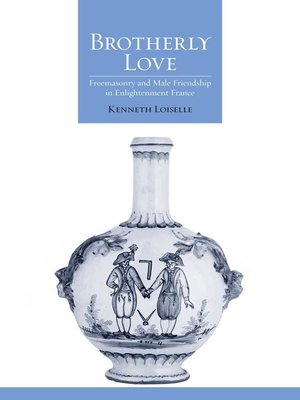Brotherly Love
ebook ∣ Freemasonry and Male Friendship in Enlightenment France
By Kenneth B. Loiselle

Sign up to save your library
With an OverDrive account, you can save your favorite libraries for at-a-glance information about availability. Find out more about OverDrive accounts.
Find this title in Libby, the library reading app by OverDrive.



Search for a digital library with this title
Title found at these libraries:
| Library Name | Distance |
|---|---|
| Loading... |
Friendship, an acquired relationship primarily based on choice rather than birth, lay at the heart of Enlightenment preoccupations with sociability and the formation of the private sphere. In Brotherly Love, Kenneth Loiselle argues that Freemasonry is an ideal arena in which to explore the changing nature of male friendship in Enlightenment France. Freemasonry was the largest and most diverse voluntary organization in the decades before the French Revolution. At least fifty thousand Frenchmen joined lodges, the memberships of which ranged across the social spectrum from skilled artisans to the highest ranks of the nobility. Loiselle argues that men were attracted to Freemasonry because it enabled them to cultivate enduring friendships that were egalitarian and grounded in emotion.
Drawing on scores of archives, including private letters, rituals, the minutes of lodge meetings, and the speeches of many Freemasons, Loiselle reveals the thought processes of the visionaries who founded this movement, the ways in which its members maintained friendships both within and beyond the lodge, and the seemingly paradoxical place women occupied within this friendship community. Masonic friendship endured into the tumultuous revolutionary era, although the revolutionary leadership suppressed most of the lodges by 1794. Loiselle not only examines the place of friendship in eighteenth-century society and culture but also contributes to the history of emotions and masculinity, and the essential debate over the relationship between the Enlightenment and the French Revolution.
|Friendship, an acquired relationship primarily based on choice rather than birth, lay at the heart of Enlightenment preoccupations with sociability and the formation of the private sphere. In Brotherly Love, Kenneth Loiselle argues that Freemasonry is an ideal arena in which to explore the changing nature of male friendship in Enlightenment France. Freemasonry was the largest and most diverse voluntary organization in the decades before the French Revolution. At least fifty thousand Frenchmen joined lodges, the memberships of which ranged across the social spectrum from skilled artisans to the highest ranks of the nobility. Loiselle argues that men were attracted to Freemasonry because it enabled them to cultivate enduring friendships that were egalitarian and grounded in emotion.Drawing on scores of archives, including private letters, rituals, the minutes of lodge meetings, and the speeches of many Freemasons, Loiselle reveals the thought processes of the visionaries who founded this movement, the ways in which its members maintained friendships both within and beyond the lodge, and the seemingly paradoxical place women occupied within this friendship community. Masonic friendship endured into the tumultuous revolutionary era, although the revolutionary leadership suppressed most of the lodges by 1794. Loiselle not only examines the place of friendship in eighteenth-century society and culture but also contributes to the history of emotions and masculinity, and the essential debate over the relationship between the Enlightenment and the French Revolution.







